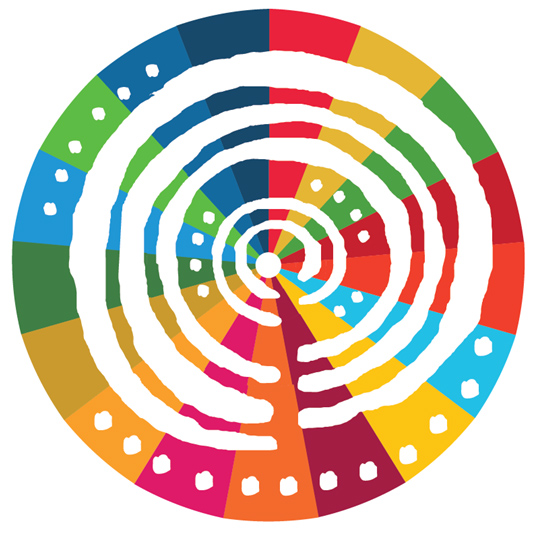Countries of the Region Encourage All Sectors of Society to Double Efforts to Achieve the 2030 Agenda for Sustainable Development
Work area(s)
The second meeting of the Forum of the Countries of Latin America and the Caribbean on Sustainable Development came to a close in Santiago, Chile with the renewed commitment by nations to advance toward meeting the Agenda’s goals.
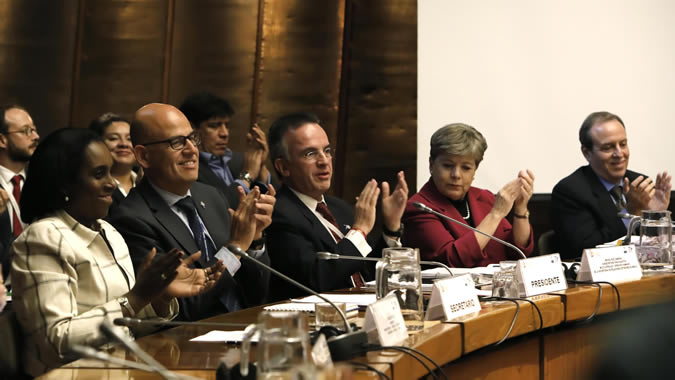
Representatives of 28 countries of Latin America and the Caribbean, 35 non-governmental organizations, specialized inter-governmental organizations and agencies of the United Nations system, and over 300 members of the private sector, academia and civil society, concluded the second meeting of the Forum of the Countries of Latin America and the Caribbean on Sustainable Development, with the renewed commitment to double efforts to include all sectors involved – public, private and civil society – to advance toward achieving the goals of the United Nations 2030 Agenda for Sustainable Development.
The meeting, organized by the Economic Commission for Latin America and the Caribbean (ECLAC) and the Government of Mexico – current president of the UN regional organization – was attended by more than 650 participants over the course of three days, and included 38 parallel events.
In its final day, three roundtables met on the economic, social and environmental challenges posed to the implementation of the 2030 Agenda, in addition to a special session on artificial intelligence and accelerated technological change, and a presentation on the importance of the regional dimension in meetings of the High-Level Political Forum on Sustainable Development (HLPF) scheduled for July at United Nations Headquarters in New York, where the conclusions of this second regional meeting that ended today in Santiago will be presented.
The closing ceremony for the high-level meeting was presided over by Miguel Ruiz Cabañas, Under Secretary for Multilateral Affairs and Human Rights of the Mexican Foreign Affairs Ministry, Ileana Núñez Mordoche, Vice Minister of Foreign Trade and Investment for Cuba – the country that will assume the ECLAC presidency in May – and Alicia Bárcena, ECLAC’s Executive Secretary.
“This Forum, for us, has been a great success. After two years, it has been established as a participative, open, inclusive and democratic space,” stated Miguel Ruiz Cabañas. “It has been a very timely Forum in that it has allowed us to reaffirm our collective commitment to the 2030 Agenda, without leaving anyone behind,” he added.
In her remarks on the Forum, Ileana Núñez, said, “We had an open, frank exchange, that at the same time was a space for learning about other experiences. The most important thing is that it was not only a dialogue among governments, but also involved the active participation of civil society. In other words, it is up to all of us to advance the 2030 Agenda.”
The Cuban Vice Minister reaffirmed her country’s commitment to continue the task spearheaded by ECLAC and its subsidiary bodies, and she took the opportunity to extend an invitation of all those present to participate in the Commission’s Thirty-Seventh Session, to be held in Havana on May 7-11.
In her closing remarks, Alicia Bárcena underscored the progress these countries have made in meeting the 2030 Agenda, just as demonstrated during this Forum. “Our region is giving the world a lesson, considering that 19 countries submitted their reports to the HLPF and three of them will do so for the second time,” she pointed out.
“We have managed to achieve the mission of our founders. At ECLAC, we dare to imagine and dream. In our region, we have a great vocation for equality, rights, and find profound inspiration in the 2030 Agenda, which is political, not technical. This Forum showed that our region is deeply committed to it,” Bárcena added.
The Executive Secretary announced that at the next meeting in 2019, there will be a special session dedicated to young people, “because we have heard loud and clear at this Forum and are working with concern for the future generation,” she said. “The 2030 Agenda is not for States but for society as a whole. We are ready to build coalitions and compacts on big issues that will lead us to environmental big push. For this you can count on ECLAC,” added the United Nations high official.
The final document on the conclusions and recommendations agreed on by the governments attending this Forum of the Countries on Sustainable Development particularly stresses the need to speed up the implementation and raise awareness on the 2030 Agenda’s Sustainable Development Goals (SDGs), considering the difficulties that still stand in the way of achieving them due to poverty, inequality, high global debt and the reduction in levels of international cooperation experienced in the region.
The delegates also emphasized that achieving sustainable development will depend upon active participation by the public and private sectors. This will require harmonization of incentives with national, long-term public investment objectives to thus be able to reduce the structural gaps of inequality in the region and eradicate poverty in all its forms.
They likewise reaffirmed the importance of mobilizing financial and non-financial resources for our regions, as well as the creation of capacities for the development, transfer, disclosure and dissemination of environmentally friendly technologies. In this arena, they called for an increase in international and regional cooperation for, among other things, more scientific and endogenous technologies development.
In the final declaration, the governments congratulated the countries of the region that have already submitted their voluntary national reviews regarding their progress on the 2030 Agenda to the HLPF, and the eight nations that are preparing to do so in 2018.
They also recognized that the adoption of the Regional Agreement on Access to Information, Public Participation and Justice in Environmental Matters (Principle 10 of the Rio Declaration) recently adopted in Escazú, Costa Rica, is an important step toward meeting the 2030 Agenda, and invited all the governments of Latin America and the Caribbean to adhere to it as of September 27, 2018 (when it opens for signing in the framework of the United Nations General Assembly).
Finally, they thanked ECLAC for producing the Second annual report on regional progress and challenges in relation to the 2030 Agenda for Sustainable Development in Latin America and the Caribbean, presented during the meeting, and congratulated the Commission for the work done during its 70 years of existence (celebrated in 2018). In this sense, they committed to ensuring that the functions and mandate of ECLAC are fully recognized at the international level and in the heart of the UN, particularly for its crucial role in the implementation of the SDGs in the region.
Related event
Related content
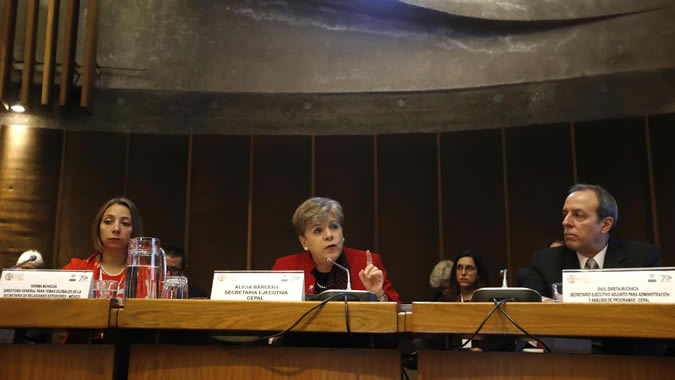
Latin America and the Caribbean Moves Toward Sustainable Development, but Challenges Remain: ECLAC
Alicia Bárcena, Executive Secretary of the regional organization, presented today the second annual report on regional progress and challenges related to the 2030 Agenda, in the framework of the…
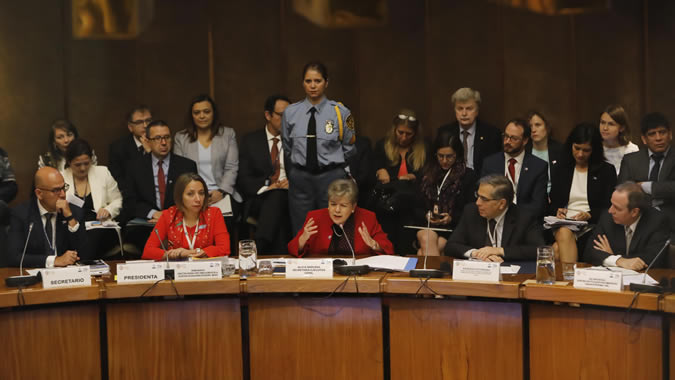
Forum of the Countries of Latin America and the Caribbean on Sustainable Development Begins with a Call for Regional Unity to Achieve the 2030 Agenda
Second meeting of the mechanism commenced at ECLAC’s headquarters in Santiago, Chile, with the participation of 26 countries and more than 500 delegates.
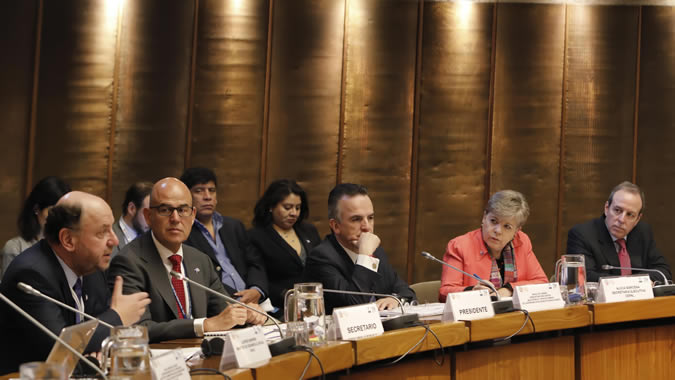
Compliance with the 2030 Agenda must be State Policy, Authorities from Latin American and Caribbean Countries Affirm
In the framework of the second meeting of the Forum on Sustainable Development, country representatives addressed continuity in the implementation of the global agenda in light of changes in…
Related link(s)
Country(ies)
- Latin America and the Caribbean
Contact
Public Information Unit
- prensa@cepal.org
- (56 2) 2210 2040
